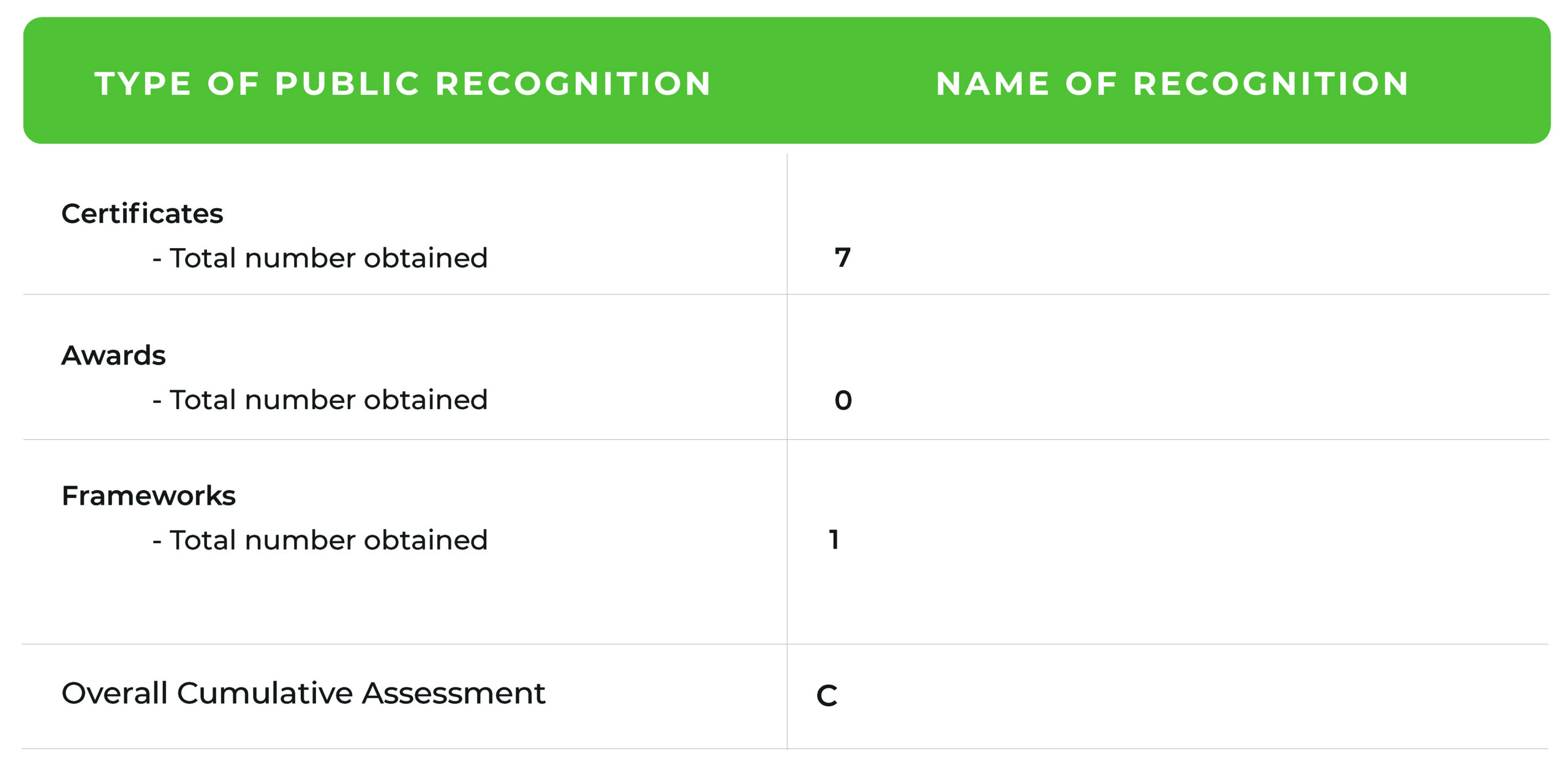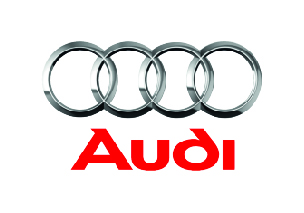
Index Sustainability Report for Audi

Company Evaluation
The C – with a positive outlook – score obtained by Audi is explained by several major factors, all contributing to the company not achieving, at least for now, the level of sustainability that it says it aspires to achieve, as summarized in Table 1 below.
There is no doubt that Audi is accelerating its changeover to electric mobility: As early as 2026, all new models from the Four Rings on the global market will be fully electric. And in 2033, the Four Rings will shut down the production of vehicles with internal combustion engines. One exception could be China, where the company is investigating the possibility of longer production depending on local demand. Audi has also announced that it already has net carbon-neutral operations for the production of its vehicles at several sites.
Currently, according to Audi official documents, the company is focusing more on sustainability throughout the entire product life cycle – from resource extraction and vehicle operation to recycling of the materials used. In the future, ESG (Environmental – Social – Governance) aspects are, according to management, to play an increasingly important role in all the decisions made by Audi, as well as in its products and services. Audi puts forward as its main ESG criteria: climate protection, the use of finite resources, employee health and safety and the perception of social responsibility.
Audi’s sustainability reporting, as shown in the table below, is scored A as it is both transparent and comprehensive; furthermore, it has obtained most of the sustainability certificates that it needs and that are important in the automotive industry (see Table 4 below for details).
Audi’s public image is also positive, and the hiring in 2022 of a well-known climate scientist, Spencer Reeder as its American director of government affairs and sustainability has no doubt helped (more details in the Technical Annex).
On other counts, the results are not so positive. There are setbacks and difficulties (see Table 2), as the progress reported in sustainable production is still generally below 50 percent of the total. One number is emblematic, indicating the length of the road that still needs to be covered: At present, only 10.7% of the total Audi brand production is fully electric and plug-in hybrids.
Company claims to phase out fuel powered cars by 2033 are contradicted by reports that this might not be the case in China where the company is also focusing on the market to sell more cars, one of the largest consumer markets in the world with high potential future consumption growth.
As for the automotive industry in general, the shortage of semiconductors as a result of the COVID-19 pandemic has caused major setbacks for the production of vehicles, making it all the more difficult to achieve sustainability.
Despite the difficulties afore-mentioned, Audi has been able to show a fairly high degree of compliance with SDG targets and its overall score in this regard is “B” (for details, see Technical Annex, Table 3). For example, Audi is an active member of the Global Battery Alliance, which aims to establish a sustainable value chain for batteries, from resource mining through to sustainable recycling. And it has successfully pursued a strategic research partnership for battery recycling. The result: Over 90% of the cobalt and nickel from the high-voltage batteries of the Audi e-tron can be recovered.
Where Audi falls back is in the area of human rights and overall employment quality. For example, it reports that it will increase the proportion of women in the first management tier (i.e. below the Board of Management level) and in the second management tier. As of now, press reports indicate that only 16.8% of managers at the second management level and 8.6% at the first management level are women. This is commendable but still very far from for full gender equality.
Hence Audi is given an overall score of C with a positive outlook, close enough to B and with a positive outlook given the company’s avowed determination to achieve sustainability – but it still is not where it should and can be.
Outlook: Positive
Audi Sustainability Scorecard
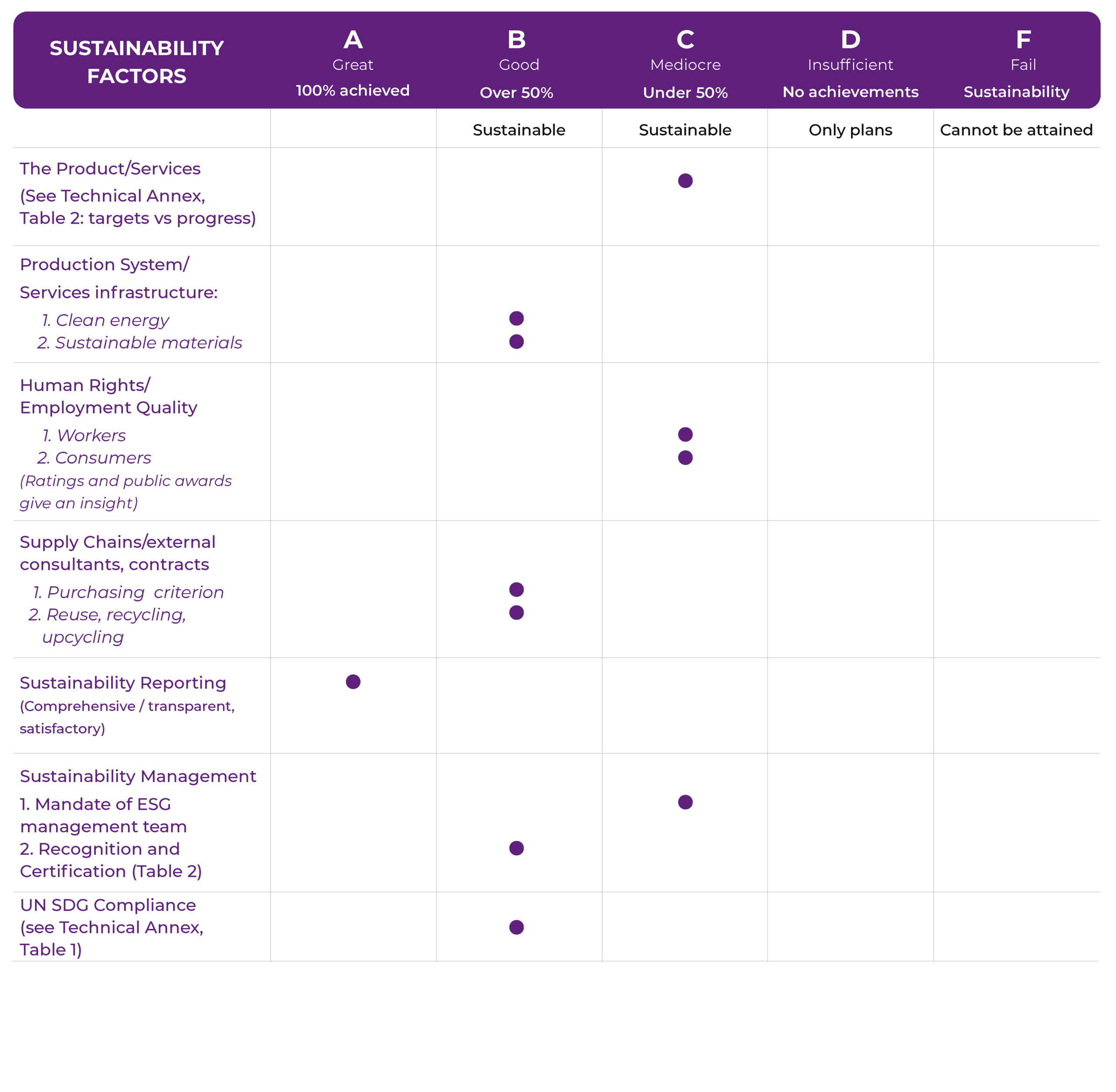
Sector
Automotive
Technical Annex
Website
Contact
AUDI AG, Auto-Union-Straße 1, 85057 Ingolstadt, Germany
+49 841 890
zentrale@audi.de
Stock Ticker
OTC:AUDVF
Audi Activity
In Brief
A German automotive manufacturer of luxury vehicles headquartered in Ingolstadt, Bavaria, Germany. As a subsidiary of its parent company, the Volkswagen Group, Audi produces vehicles in nine production facilities worldwide.
Employees
85,750
Audi Sustainability Activity
Activity
Audi is accelerating its changeover to electric mobility: As early as 2026, all new models from the Four Rings on the global market will be fully electric. And in 2033, the Four Rings will shut down the production of vehicles with internal combustion engines. One exception could be China, where the company is investigating the possibility of longer production depending on local demand. Audi already has net carbon-neutral operations for the production of its vehicles at several sites.
Now the company is focusing more on sustainability throughout the entire product life cycle – from resource extraction and vehicle operation to recycling of the materials used. In the future, ESG (Environmental – Social – Governance) aspects are, according to management, to play an increasingly important role in all the decisions made by Audi, as well as in its products and services. Audi puts forward as its main ESG criteria: climate protection, the use of finite resources, employee health and safety and the perception of social responsibility.
Revenue and Market Cap
Annual Revenue: $51.5 B
Market Cap: $83 B
Sustainability/ESG Awards, Ratings & Rankings
ESG ratings
- n.a., under Volkswagen Group
Awards
- n.a., under Volkswagen Group
Audi in the news: Press, Reviews and Social Media
News
- Tengler (2022) – Daniel Weissland, the President of Audi of America discussing commitments Audi has to EV.
- Davies (2022) – Audi’s parent company being awarded the title of ‘OEM of the Year’ at the annual EVIE Awards, for showing a “clear strategy beyond the vehicle”.
- Warner (2022) – What happens when a car company with a checkered record on the environment hires a climate scientist. Audi of America’s director of government affairs and sustainability, Spencer Reeder, a climate scientist, lead author on the 2014 U.S. National Climate Assessment, and earlier served as Lead Policy Strategist for Climate Change at the Washington State Department of Ecology
Certificates
- ISO 14001
- ISO 50001
- EMAS
- Gold Certificate of the German Association for Sustainable Building
Highlights from Audi Sustainability Report
Highlights
-
57.5% increase in share of all-electric vehicles in deliveries compared to the previous year
-
43,866 Audi e-tron models were produced at Audi Brussels in 2021
-
80% of the total of 370 criteria were fulfilled by Audi for initial certification by the Top Employers Institute
-
16.8% of managers at the second management level and 8.6% at the first management level are women
-
A net total of more than 195,000 metric tons of CO2 are prevented at the Audi sites in Inglostadt, Neckarsulm, Gyor and the bulti-brand site in Bratislava thanks to a closed-loop aluminum process that AUdi has been using since 2017
-
Around 150 countries are currently included in the global pilot project in which Audi is using Artificial Intelligence (AI) to analyze the extent to which suppliers meet the defined sustainability criteria
Achievements
-
A net total of more than 195,000 metric tons of CO2 are prevented at the Audi sites in Ingolstadt, Neckarsulm, Gyor and the bulti-brand site in Bratislava thanks to a closed-loop aluminum process that AUdi has been using since 2017
Weaknesses and Setbacks
-
Claims to phase out fuel powered cars by 2033, but reports that this might not be the case in China where the company is also focusing on the market to sell more cars, one of the largest consumer markets in the world with high potential future consumption growth.
-
As for the automotive industry in general, the shortage of semiconductors as a result of the COVID-19 pandemic has caused major setbacks for the production of vehicles.
Standards and Frameworks
- Aluminium Stewardship Initiative (ASI)
-
- Performance Standard
- Chain of Custody
- GRI Standards
- FIA Three-Star Environmental Accreditation
Table 1: Targets vs Progress Reported
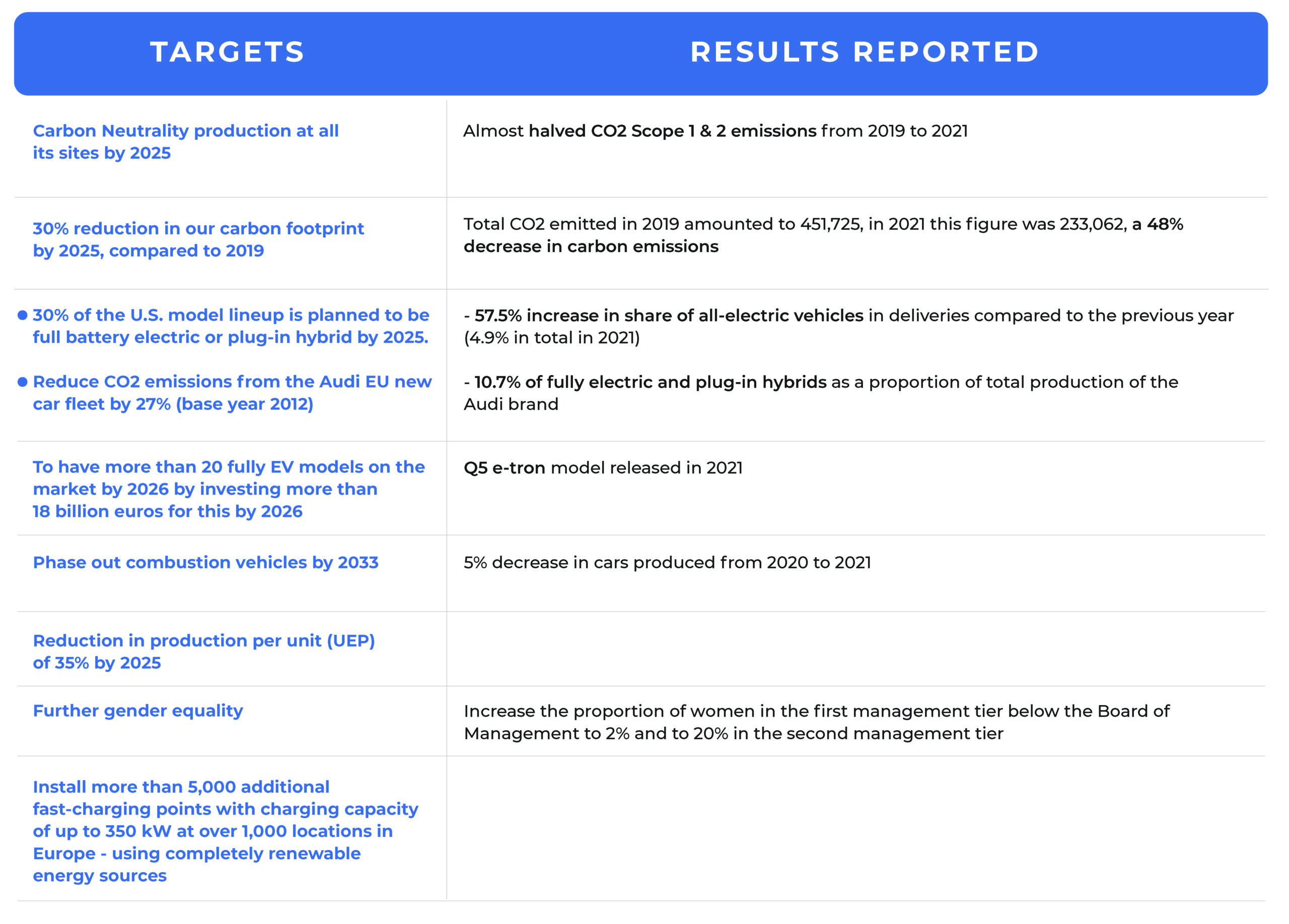
Content Sources
Davies, E. (2022). Volkswagen Group UK named ‘OEM of the Year’ at EVIE Awards. Motor Trader. [Accessed 13 Oct. 2022]
Tengler, S. (2022). Investors And Buyers: Very Confusing Sustainability Choices In The Auto Industry. Forbes. [Accessed 13 Oct. 2022]
Warner, B. (2022) What happens when a car company with a checkered record on the environment hires a climate scientist. [Accessed 22 Nov. 2022]
Table 2: UN SDGs Compliance Analysis
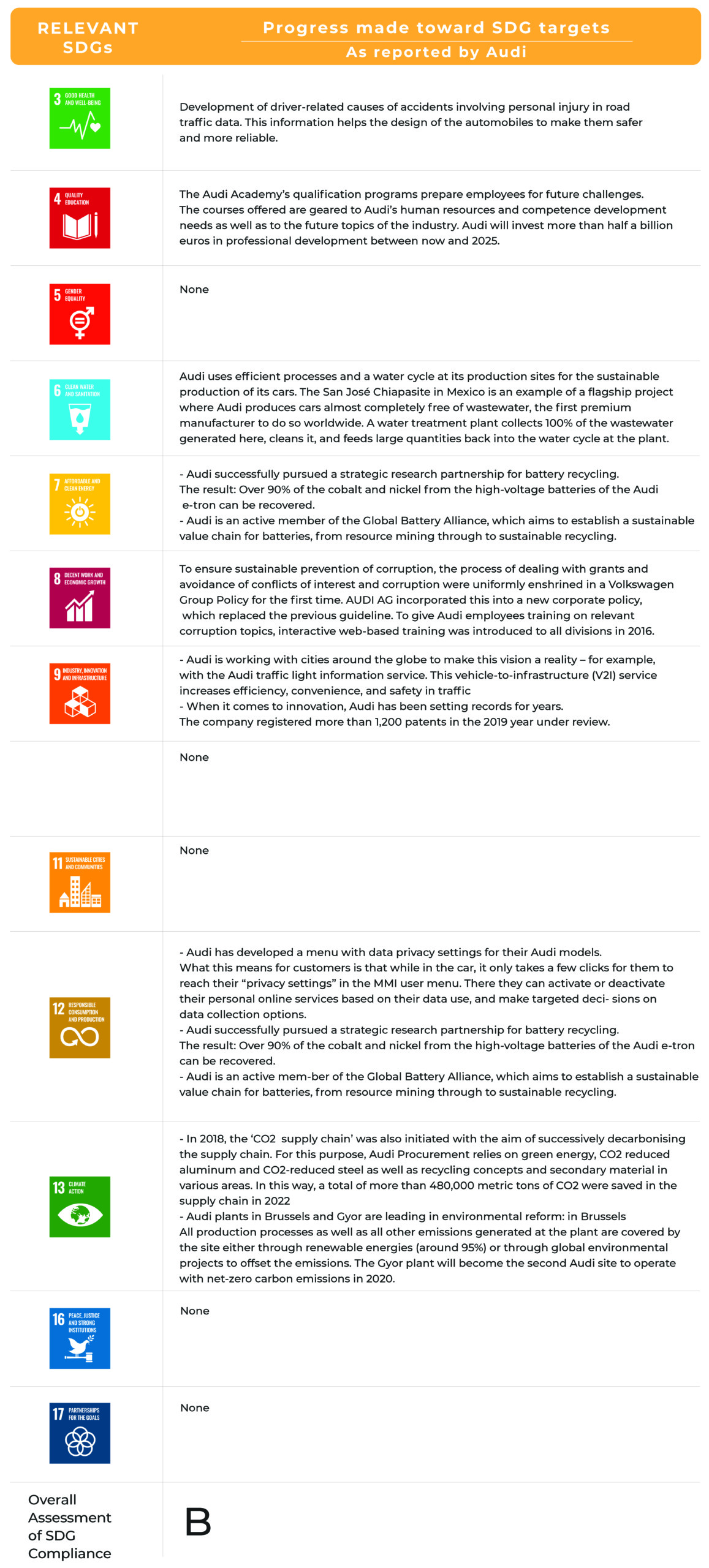
Table 3: Sustainability Certificates, Awards and Listings
